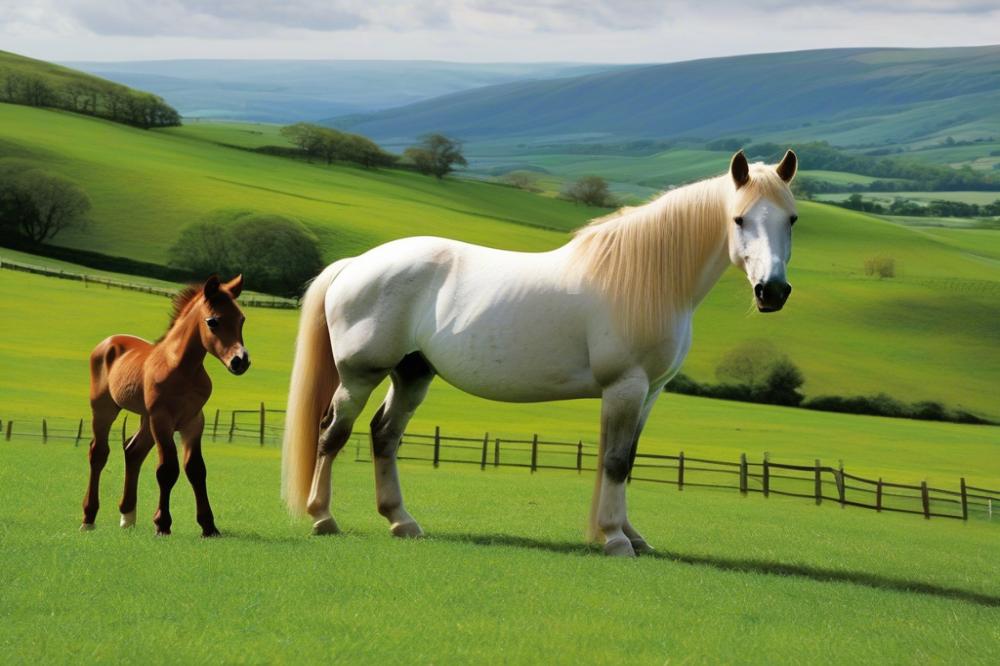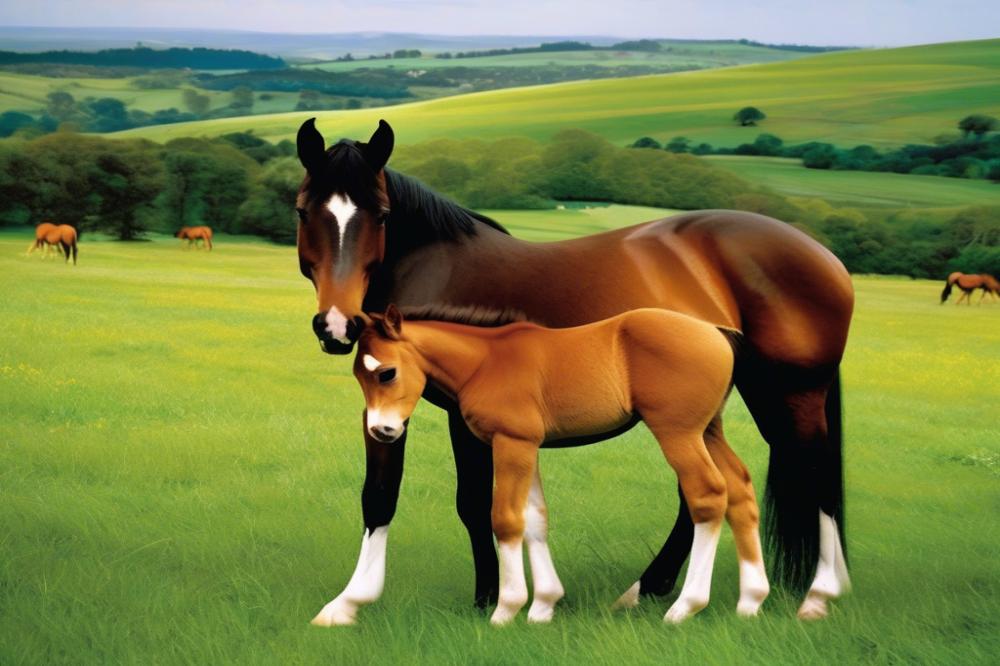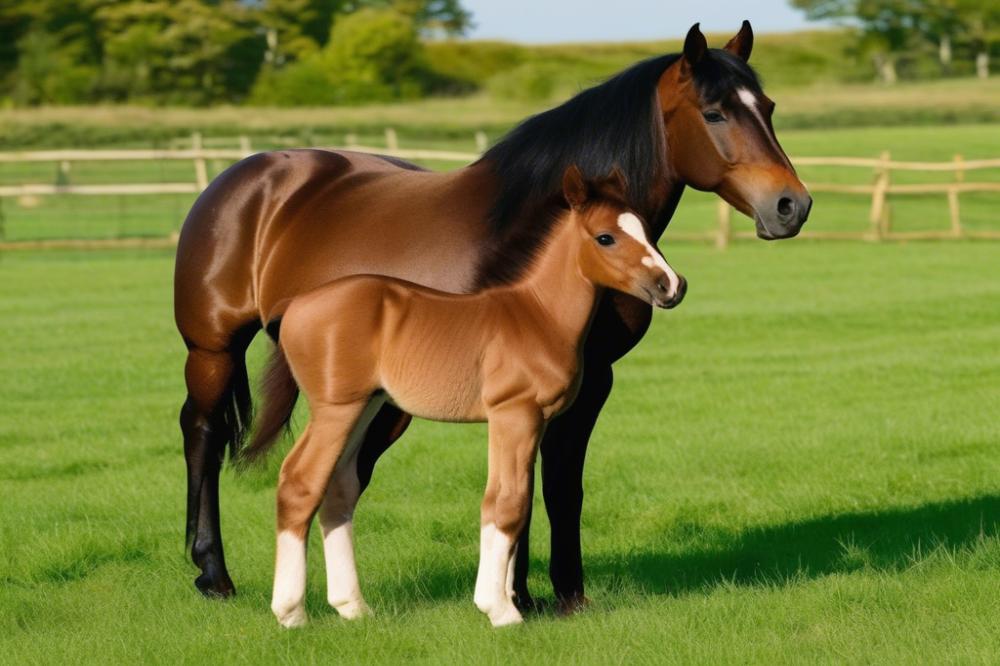Introduction
breeding horses is a delicate process that requires knowledge and dedication. It begins with careful selection of the mare and stallion, considering factors like genetics, health, and overall temperament. A skilled breeder understands how these elements influence the future of the foal. This careful planning can lead to healthy offspring with desirable traits.
Raising healthy foals is essential for maintaining strong bloodlines and ensuring the longevity of breeds. Foals, in their early days, are fragile and vulnerable. Every step taken in their first months can greatly impact their development. Proper nutrition, socialization, and medical care play vital roles in their growth. Observing the foal’s progress can highlight areas that need attention, making it crucial for owners to stay engaged.
This article will explore the journey of foals from birth to weaning. We will discuss the best practices for nutrition and care and how to create a supportive environment for the foal. Strategies for monitoring health and development will also be covered. Understanding these aspects is key to raising robust and thriving horses. By following expert guidance, you can raise healthy foals and provide them with a strong start in life. Let’s delve into the important stages of their development, focusing on specific needs during this critical time.
You’ll find valuable insights that will benefit both novice and seasoned horse owners. By the end, you will be equipped with the knowledge to provide the best for your foal. After all, a healthy start sets the stage for a successful future in the world of horses. Whether you’re looking for a companion or a future show champion, the groundwork laid in the early months will be invaluable.
In the following sections, we will elaborate on topics related to #anchor_text_1# and #anchor_text_2#, highlighting effective methods for care and upbringing. Each element is important for fostering health and well-being in these young equines.
Understanding Foal Development

Foal growth occurs in distinct stages from birth until weaning. The first stage begins right after a foal is born. Newborn foals are typically fully wet after birth. This wetness helps them adapt to their environment. In this early period, they quickly develop strength, often able to stand within a few hours. This ability is critical for them to find their mother and nurse.
During the first few days, foals rely heavily on colostrum. This first milk is rich in antibodies, which aids their immune system. Behavioral milestones emerge significantly during this time. Foals start to bond with their mothers. They also learn to recognize their surroundings. Such experiences shape their future behavior.
Physical and Behavioral Milestones
The development continues through various phases. By about two weeks, foals begin to explore more. They get curious about the world around them and venture further from their mothers. Physical growth is evident. The legs become stronger, and the coat starts to shine. Social interaction plays a huge role in their training.
At around two months, foals begin to nibble on hay. This behavior is a foundation for their future diet. They will still depend on their mother’s milk but start to learn about solid food. Distinct personalities often emerge by this age. Observing how they interact with others can provide insights into their future training needs.
Importance of Observation During These Stages
Caring for foals requires keen observation. Noticeable changes in health or behavior can signal issues. Each stage of growth comes with nuances that deserve attention. A healthy foal is curious and active. If a foal seems withdrawn or lethargic, this could point to a problem. Regular checks can help identify any concerns early on.
Behavioral traits often vary among foals. Some may be more playful, while others are more reserved. Understanding individual temperaments aids in training them effectively later on. Watching interactions with their peers can also be quite revealing. Foals learn from each other during play, helping them develop critical social skills.
Overall, the journey from birth to weaning is filled with remarkable changes. These stages shape not just their health but also their behavior. Paying close attention ensures that caregivers can address the foals’ needs during their formative months. This proactive approach can lead to raising strong, healthy horses for the future.
Nutrition for the Dam and Foal

Nutritional needs of the mare during pregnancy
A pregnant mare requires a diet rich in essential nutrients. These nutrients support the developing foal and help the mare maintain her health. Higher energy needs occur during the later stages of pregnancy. This means more calories are necessary to meet the demands of both the mare and her growing foal. Feeding good quality forage, like hay or pasture, is crucial. This provides the foundation of a balanced diet.
Essential nutrients for lactating mares
Lactating mares have increased nutritional requirements. Calcium and phosphorus are particularly important during this time. These minerals help produce nutritious milk for the foal. Protein intake must also be sufficient to support both milk production and the mare’s recovery from pregnancy. Many breeders choose concentrated feeds to fulfill these needs. Monitoring body condition is critical to adjust diets as needed.
Introduction of solid food to foals
Foals begin exploring solid food around two to three weeks of age. They are naturally curious and often try nibbling on their mother’s feed. Offering high-quality hay and grain gradually assists in this transition. It supports proper digestion and allows foals to learn from their mothers. Gradually increasing the amount of solid food helps their development. Care must be taken to avoid overwhelming them.
Importance of balanced diet and feeding practices
Providing a balanced diet is vital for the health of both the mare and foal. Each feeding should contain a mix of forage, grains, and supplements tailored to their needs. Feeding practices should focus on consistency. Regular feeding times help establish routines. Monitoring both foal and mare for any signs of health issues is crucial. Healthy eating habits foster long-term well-being for the foal.
Health Care and Veterinary Support

Routine veterinary check-ups play a crucial role in the well-being of foals. Regular visits allow veterinarians to assess growth and development. These check-ups help catch any potential health concerns early. Foals should have their first visit soon after birth. This way, any immediate issues can be addressed promptly.
A vaccination and deworming schedule is essential. Different vaccines protect against diseases, such as tetanus and rhinopneumonitis. Consult your vet on when to begin vaccinations. Deworming is just as important; foals often pick up parasites from the environment. Your veterinarian can suggest an effective deworming routine based on local conditions.
Common Health Issues in Foals and Prevention
Foals can encounter various health issues during their early months. Some common problems include respiratory infections, diarrhea, and joint problems. These conditions may arise from a lack of exposure to essential nutrients or inadequate care. Good hygiene practices can prevent many illnesses. Keeping the living area clean and dry is an effective measure.
Provide foals with a balanced diet to support healthy growth. Colostrum, the first milk from the mare, is vital for immunity. Ensuring that the foal receives this within the first hours of life can protect it from diseases. Observing the foal’s behavior can also help identify problems early.
Importance of Neonatal Care
Neonatal care is all about the days and weeks after birth. This phase is pivotal for a foal’s health and development. Close monitoring during this time is necessary. Foals need to nurse within the first few hours. This can significantly boost their chances for a healthy start.
Checking for signs of health issues is crucial in these early days. Look for adequate nursing behavior, alertness, and a strong bond with the mare. Any abnormalities should trigger an immediate call to a veterinarian. Quick responses can prevent minor issues from becoming serious. Overall, consistent care and veterinary support pave the way for raising healthy foals.
Socialization and Handling
Early handling and bonding with foals play a crucial role in their development. Foals that receive gentle attention soon after birth tend to grow more comfortable with human interaction. This stage lays the foundation for a trusting relationship between the foal and its handler. It sets up a bond that can last throughout their lives.
Introducing foals to other horses and people is equally important. They should meet friendly horses at a young age. Learning to interact with their peers helps them develop crucial social skills. It also allows them to understand herd dynamics. When foals are handled regularly, they learn to accept various situations. This exposure builds their confidence and teaches them how to behave in different environments.
Social behaviors are vital in a foal’s growth. They learn through observation and mimicry. Watching larger horses interact enables foals to pick up on cues that indicate safety or danger. Experience with humans adds another layer to their social learning. Familiarity with different people helps them grow into well-adjusted adults. Calm handling creates a positive learning environment, encouraging the foal to explore new experiences.
Overall, the early days are a time filled with learning and discovery. Each interaction, whether with an equine friend or a human caregiver, provides valuable lessons. Foals that grow up in a supportive and varied atmosphere develop higher adaptability skills. Emphasizing the importance of socialization and handling makes a significant difference in the lives of young horses. Nurturing these connections leads to a smoother transition into adulthood.
Weaning Practices
Timing is a crucial aspect of weaning foals. This process typically occurs between four to six months of age. Some horse owners prefer to start earlier while others may wait longer. Selecting the right moment is important for the health of both the foal and the mare.
Different methods exist for weaning. One common approach is gradual weaning, where the foal spends some time apart from the mare each day. This allows them to adjust slowly. Another method is abrupt weaning, where they are separated completely. While this can work, it often leads to more stress for both animals.
Emotional factors should not be overlooked during weaning. Foals have strong bonds with their mothers. Separating them can cause anxiety and distress. The mare may also experience feelings of loss. Watching them can be hard, but with proper care, they will adapt over time.
Physical considerations are equally important. Stress can affect a foal’s health. They may lose weight or refuse to eat. Keeping an eye on their body condition helps in addressing any issues early on. A healthy foal will adapt better to independent life.
Transitioning to Independent Feeding
As foals begin eating on their own, access to lush pasture and quality hay is vital. Introducing grain or specially formulated feed can provide the necessary nutrients. Gradually increasing the amount they consume helps ensure they are getting enough food. It’s important for foals to learn how to graze and self-feed effectively.
Monitoring their eating habits is crucial. Some foals may take longer to adjust than others. Providing multiple feeding stations can encourage them to eat comfortably. Check for signs of discomfort as they shift to this new diet. Proper hydration should also be available at all times.
Post-Weaning Care for Foals
After weaning, foals require special attention. Maintaining regular health checks is essential. Vet visits help foster a healthy growth trajectory. Make sure to keep vaccinations and deworming on schedule. This care helps mitigate health risks.
Socialization plays a key role in a foal’s adjustment. Providing companionship is beneficial. Either a buddy from the same herd or another gentle horse can help. Regular exercise is also necessary. Promoting playtime helps them develop strength and coordination.
Behavioral changes may occur during this transition. Foals might exhibit more curiosity or even some frustration. Being patient and understanding is critical. Consistent handling will help build confidence and trust. A good environment will support their overall well-being during this phase.
Final Thoughts on Raising Healthy Foals
In summary, raising healthy foals involves several essential aspects. First, proper nutrition is vital for their growth and development. A balanced diet including high-quality forage and suitable grain makes a significant difference. Regular veterinary check-ups help in monitoring their health closely. Early vaccinations will protect them from serious diseases.
Careful management of their environment is equally important. A clean, safe space fosters a good start in life. foals thrive in social settings with their mothers and other horses. Additionally, social interactions play a role in their emotional well-being. This companionship helps them develop into well-adjusted adults.
Moreover, educating yourself and staying updated with best practices will pay off. Breeders who commit to excellent care see remarkable outcomes. The benefits of investing time and resources into proper management are clear. Healthy foals lead to happy horses and satisfied owners.
We encourage breeders everywhere to take these insights to heart. Implementing the practices discussed will help you every step of the way. As you nurture your foals, remember that this journey greatly impacts their future. For further guidance, explore valuable resources and communities dedicated to equine care.
Investing in the welfare of your foals is truly rewarding. With thoughtful attention, you set a solid foundation for their lives. By adopting these practices, you pave the way for them to thrive, grow, and become strong adult horses. Your efforts will have lasting benefits, not only for them but also for your entire breeding program. Embrace the journey and take pride in each healthy foal you raise.
Learn more about nutrition for foals | Discover best management practices



